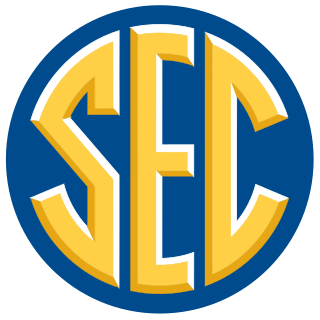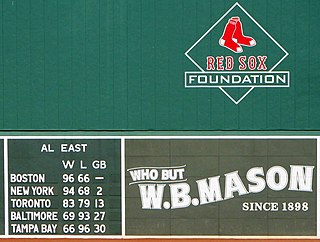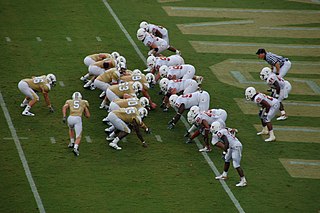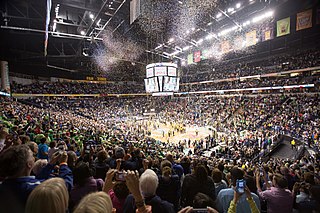The playoffs, play-offs, postseason or finals of a sports league are a competition played after the regular season by the top competitors to determine the league champion or a similar accolade. Depending on the league, the playoffs may be either a single game, a series of games, or a tournament, and may use a single-elimination system or one of several other different playoff formats. Playoff, in regard to international fixtures, is to qualify or progress to the next round of a competition or tournament.

The Southeastern Conference (SEC) is an American college athletic conference whose member institutions are located primarily in the South Central and Southeastern United States. Its fourteen members include the flagship public universities of ten states, three additional public land-grant universities, and one private research university. The conference is headquartered in Birmingham, Alabama. The SEC participates in the National Collegiate Athletic Association (NCAA) Division I in sports competitions; for football it is part of the Football Bowl Subdivision (FBS), formerly known as Division I-A.
A tournament is a competition involving at least three competitors, all participating in a sport or game. More specifically, the term may be used in either of two overlapping senses:
- One or more competitions held at a single venue and concentrated into a relatively short time interval.
- A competition involving a number of matches, each involving a subset of the competitors, with the overall tournament winner determined based on the combined results of these individual matches. These are common in those sports and games where each match must involve a small number of competitors: often precisely two, as in most team sports, racket sports and combat sports, many card games and board games, and many forms of competitive debating. Such tournaments allow large numbers to compete against each other in spite of the restriction on numbers in a single match.
A bracket or tournament bracket is a tree diagram that represents the series of games played during a knockout tournament. Different knockout tournament formats have different brackets; the simplest and most common is that of the single-elimination tournament. The name "bracket" is American English, derived from the resemblance of the links in the tree diagram to the bracket punctuation symbol ] or [. The closest British term is draw, although this implies an element of chance, whereas some brackets are determined entirely by seeding.
In an organized sports league, a typical season is the portion of one year in which regulated games of the sport are in session: for example, in Major League Baseball the season lasts approximately from the last week of March to the last week of September. In other team sports, like association football or basketball, it is generally from August or September to May although in some countries – such as Northern Europe or East Asia – the season starts in the spring and finishes in autumn, mainly due to weather conditions encountered during the winter.

An exhibition game is a sporting event whose prize money and impact on the player's or the team's rankings is either zero or otherwise greatly reduced. In team sports, matches of this type are often used to help coaches and managers select and condition players for the competitive matches of a league season or tournament. If the players usually play in different teams in other leagues, exhibition games offer an opportunity for the players to learn to work with each other. The games can be held between separate teams or between parts of the same team.

The National Football League (NFL) playoffs are the games that make up the single-elimination tournament held after the regular season to determine the league champion. Currently, seven teams from each of the league's two conferences qualify for the playoffs. A tie-breaking procedure exists if required. The tournament culminates in the Super Bowl: the league's championship game in which two teams, one from each conference, play each other to become champion of the NFL.
An athletic conference is a collection of sports teams, playing competitively against each other in a sports league. In many cases conferences are subdivided into smaller divisions, with the best teams competing at successively higher levels. Conferences often, but not always, include teams from a common geographic region.

In most North American sports, the phrase games behind or games back is a common way to reflect the gap between a leading team and another team in a sports league, conference, or division.

A sports rating system is a system that analyzes the results of sports competitions to provide ratings for each team or player. Common systems include polls of expert voters, crowdsourcing non-expert voters, betting markets, and computer systems. Ratings, or power ratings, are numerical representations of competitive strength, often directly comparable so that the game outcome between any two teams can be predicted. Rankings, or power rankings, can be directly provided, or can be derived by sorting each team's ratings and assigning an ordinal rank to each team, so that the highest rated team earns the #1 rank. Rating systems provide an alternative to traditional sports standings which are based on win–loss–tie ratios.
There are a number of formats used in various levels of competition in sports and games to determine an overall champion. Some of the most common are the single elimination, the best-of- series, the total points series more commonly known as on aggregate, and the round-robin tournament.
In games and sport, a tiebreaker or tiebreak is used to determine a winner from among players or teams when their scores are tied at the end of a contest, or a set of contests.
A wild card is a tournament or playoff berth awarded to an individual or team that fails to qualify in the normal way; for example, by having a high ranking or winning a qualifying stage. In some events, wildcards are chosen freely by the organizers. Other events have fixed rules. Some North American professional sports leagues compare the records of teams which did not qualify directly by winning a division or conference.
In sport, a championship is a competition in which the aim is to decide which individual or team is the champion.
Professional sports leagues are organized in numerous ways. The two most significant types are one that developed in Europe, characterized by a tiered structure using promotion and relegation in order to determine participation in a hierarchy of leagues or divisions, and a North American originated model characterized by its use of franchises, closed memberships, and minor leagues. Both these systems remain most common in their area of origin, although both systems are used worldwide.
In sports, a bye is the preferential status of a player or team that is automatically advanced to the next round of a tournament without having to play an opponent in an early round.
In a group tournament, unlike a knockout tournament, there is no scheduled decisive final match. Instead, all the competitors are ranked by examining the results of all the matches played in the tournament. Typically, points are awarded for each match, with competitors ranked based either on total number of points or average points per match.
A one-game playoff, sometimes known as a pennant playoff, tiebreaker game or knockout game, is a tiebreaker in certain sports—usually but not always professional—to determine which of two teams, tied in the final standings, will qualify for a post-season tournament. Such a playoff is either a single game or a short series of games.

In sports, the final four is the last four teams remaining in a playoff tournament. Usually the final four compete in the two games of a single-elimination tournament's semi-final (penultimate) round. Of these teams, the two who win in the semi-final round play another single-elimination game whose winner is the tournament champion. In some tournaments, the two teams that lose in the semi-final round compete for third place in a consolation game.
In sports, strength of schedule (SOS) refers to the difficulty or ease of a team's/person's opponent as compared to other teams/persons. This is especially important if teams in a league do not play each other the same number of times.





